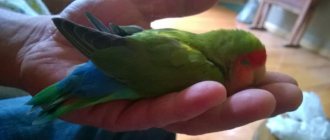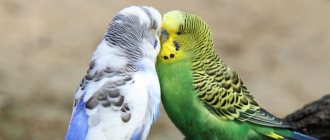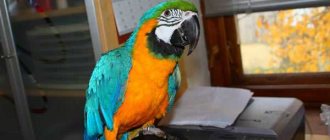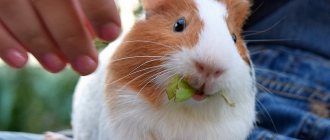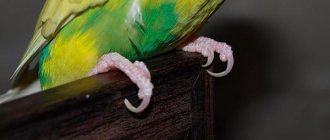- home
- Parrot
- Care
04/18/2019 Living with pets in the house is fun and friendly. Sometimes the four-legged and feathered inhabitants of the apartment help the owner to throw out negative emotions with impunity on them, and not on the human partner. So, without knowing it, pets serve as peacekeepers.
Pros of keeping parrots
Pets such as parrots have many advantages:
- Friendliness and sociability. Many people seek to have parrots in their home to alleviate loneliness. Parrots are social animals that need constant communication either with relatives or with humans. A bird can become a true friend to a lonely person or a full member of a large family. These birds love affection, strive to spend as much time as possible with the owner, love to sit on the shoulder or head and participate in the owner's household chores.
- Playfulness. These birds love to play with various objects, and watching the parrot's tricks gives people a lot of positive emotions.
- High intelligence and good learning ability. Many species learn to imitate human speech, as well as perform tricks.
- Cellular content. This is the main advantage of parrots. Since the bird sits in a cage most of the time, it does not destroy the apartment or damage the furniture.
- Long life expectancy. Small species live 10-15 years, and large ones live up to 100 years.
- No unpleasant odor. The bird itself has no smell; If you clean it regularly, there will also be no smell from the cage.
- Attractive appearance. Most species have bright colors, and some have unusually shaped plumage.
Cleaning the cage
Usually the cage has a retractable tray to make it easy to clean. It’s convenient to put paper in it: then you don’t have to wash the bottom of the droppings, you just need to change the paper for fresh one. I usually do this every other day.
I use the cheapest printer paper possible. Three sheets are enough to completely cover the bottom. Since Snowball sometimes chews paper, I put only clean sheets in the cage: paints and inks are harmful to the bird.
About once a month you need to do a general cleaning of the cage. Then I remove the top and wash the bottom and pan. It is convenient to wash the cage with a high-pressure shower. Plain water is enough; I don’t use cleaning products. I wipe the rods with a cloth as needed.
A big surprise for me was the fact that parrots do not eat all the grains. They eat away the nucleoli, and the husk scatters around the cell. Two or three times a year, the parrot molts, so that feathers are added to the husk. You have to vacuum the area around the cage every day. There is no unpleasant odor from the parrot.
Disadvantages of keeping parrots
There are also disadvantages to keeping parrots at home:
- Noise. This is the main disadvantage of a parrot. Parrots are very sociable and active birds. During daylight hours, they constantly scream, rattle toys and bowls, climb noisily and fly around the cage. If the cage is not covered with a dark cloth at night, the bird will wake up at sunrise and begin to make noise. The screams of parrots, especially large species, are very loud and can disturb not only the owners, but also the neighbors in an apartment building.
- Dirt. This is also a big disadvantage of parrots. These birds are not known for their neatness, so there will always be feathers, leftover food and droppings scattered around the cage. During walks, the bird will also leave droppings and feathers everywhere. In many species, the skin produces a special powder that birds use to treat their plumage. In the room where the cage is, everything will be covered with a layer of this powder. Therefore, the room will have to be cleaned daily.
- Destructiveness. These birds have a powerful and sharp beak and great strength. During walks, they will chew furniture, tear curtains and wallpaper, and dig soil in flower pots. The cage must be strong, otherwise the bird will bend the bars or learn to open the door and get out of its own free will.
- Inability to leave your pet alone for a long time. Birds have a fast metabolism, so they cannot go long without food and water. You need to add food and change water daily or even twice a day. Therefore, if owners need to leave for a long time, they will have to look for someone who will take care of the animal.
- The need to pay a lot of attention to your pet. Parrots need to constantly communicate with their relatives or people. Without communication, they experience stress, begin to pluck their own feathers, refuse to feed, become lethargic, and attract attention with loud screams.
- Cellular content. Along with the advantages of cellular housing, there are also disadvantages. The cage takes up quite a lot of space, so it is necessary to allocate a separate space in the room where it will stand. The cage tray gets dirty quickly and needs daily cleaning. In addition, the entire cage and accessories should be washed regularly.
- Possible health problems for the owner. Some people develop allergies to bird waste or feed. Birds bought from a pet store or poultry market can cause psittacosis, salmonellosis, campylobacteriosis and chlamydia. Large parrots bite painfully and, if frightened, can cause serious injuries to humans with their beaks and claws.
Owner reviews
In general, budgies receive positive reviews. But some owners, alas, face serious difficulties.
We bought it for our child after watching the cartoon “Rio”. The bird is completely picky and eats everything. A sea of positive emotions and positivity. The only drawback is feathers all over the kitchen
Lina, Simferopol
Beautiful, smart and extremely curious animals. Great as an alarm clock. It’s better not to take children, you have to look after it yourself
Larisa, Moscow
Doesn't let you get bored on dreary evenings. The bird is always cheerful and cheerful. There are never any problems with feeding or cleaning. The only downside is that there is only trash around the cage.
Vika, Tula
The parrot lived with us for exactly two months before molting. The children developed an allergy to fluff and had to give it to a friend
Elena, Krasnodar
What is the best parrot to have at home?
When choosing a pet, people are often interested in what size and type of parrot they should have in their apartment. Small (lovebird, budgerigar) and medium-sized (corella) species are best suited for apartment keeping. They are easily tamed, non-aggressive, learn tricks and repeat human speech, and are not capable of severely destroying an apartment or causing serious injury to the owner. A cage with such a bird does not take up much space. A small parrot makes less noise and dirt than a large one. It is easier to care for, and food for it is cheaper.
Lovebird. Budgerigar. Corella.
On a note! Large species (cockatoos, macaws, grays) are more suitable for keeping in a country house. In this case, you can allocate a separate room for your pet or build a spacious enclosure; his screams will not disturb the neighbors.
Important bird
Among domestic birds, parrots stand out for their bright individuality. The following types of contents are common in apartments:
- wavy;
- lovebirds;
- cockatiels (family cockatoos);
- Amazons.
The pet leaves no one indifferent, attracting attention with its bright appearance and behavior. Even buying a handsome little pet requires the potential owner to think carefully, find out the specifics of the care and nutrition of the future pet, and treat its possible diseases. This bird is usually unpretentious, but there are problems with it too. The pros and cons of having a parrot at home should be weighed before purchasing one.
Positive aspects of purchasing a parrot
Among the positive aspects we highlight the following:
- The beauty of parrots . This is the simplest and most natural plus. Variations of their varieties, colors, brightness will not leave indifferent even not very big fans of these birds.
- Improving a person's psychological state . World-class scientists have proven that they are able to help people fight depression and easily lift their spirits. Lonely people are given the opportunity not to feel confused, forgotten, and are allowed to feel at one with nature. You can talk to them and even teach them how to pronounce certain phrases. This is a kind of antidepressant; there are even special techniques using parrots to improve mental balance.
- They treat the cardiovascular system.
- The ability to destroy negative energy . In this case, you need to trust the opinion of psychics who claim this property.
- Develop creative skills, if any.
- They bring a sea of joy . Parrots also have a positive effect on adults, but it should be noted that they bring particular benefits to homes where there are children. Thanks to these birds, children learn to explore the world, even those children who do not speak (at an early age) can teach their pet to speak and pronounce words, thus they themselves will learn to speak faster. Parrots are also taught to take care of someone else besides themselves, so this creates responsibility.
- There is practically no unpleasant odor from the parrot's cage.
- Sharp mind . It would seem that parrots understand little, but after living with him for some time, it will become clear that he not only listens, but also understands what you are talking about, sings along to the rhythm of your conversation, and speaks.
- Under conditions of good care they live a long time ( 10-15 years ). Which is also important, because it’s hard to lose a beloved pet.
- They are relatively inexpensive to maintain . All you need is special food for parrots, and throughout the day you will need one, maximum two teaspoons, water, sand. And if you want to add vitamins to your diet, you can give herbs and ground eggshells. Agree, everything mentioned above cannot be expensive.
Disadvantages of keeping a parrot
Among the disadvantages of the content are the following:
- The need for a large housing area . Unfortunately, parrots cannot be walked and simply need to fly around the house, so if your living space is twelve square meters, owning these birds is not an option.
- Frequent allergies among owners . Feathers, droppings, and even small particles of dust from flapping wings can cause allergic reactions. These include inflammation of the respiratory tract, rashes, and ordinary sneezing.
- Very vocal . Parrots are still birds, and their main form of communication is singing. It is not always pleasant, especially when it turns into a scream, because they demand that attention be paid to them. The salvation in such cases will be an ordinary thick fabric that can be used to cover the cage.
- A lot of trash . Although these birds are not whimsical in their choice of food, they love to scatter and rake it. In addition, they molt twice a year, during which time a lot of fluff forms around the cage. Also, parrots’ homes need to be cleaned frequently. In hot weather - every other day, in cold weather - two or even three times a week.
- Sabotage character . When releasing a bird from its cage, damage to furniture, wallpaper, flowers is possible, and even droppings can end up anywhere.
- Painful bites . Parrots bite very painfully until they are tamed; it takes a lot of patience to do this, but there is no other way.
Lovebirds as the first domestic birds
One of the smallest parrots that develop quietly and live in captivity. Their length reaches 10-17 cm, and their body weight is 40-60 g.
Most often you can find lovebirds with a basic green color.
You can recognize them by their appearance, thanks to their strong curved beak of red and yellow color. These birds have an active and curious character. They fly beautifully, move quickly and climb branches. Talking lovebirds are extremely rare to find. Therefore, it is generally accepted that they are poorly trained.
The peculiarity of lovebirds is that they are monogamous and choose one partner for life
.
If one dies, then the second one grieves and is sad for a very long time. But after some time it recovers. On average, lovebirds live 20 years. They are unpretentious in care, but they definitely need to be raised in families.
To be or not to have a parrot in your home?
You must decide the answer to this question for yourself. What is clear is that in no case should you bring a parrot into the house because of one banal word “I want”! Here you need to weigh the pros and cons and decide on your reasoned choice not for a few days, but for several years, and possibly decades!
Most people keep cats or dogs at home. Parrots, especially large ones, are still considered exotic, despite the fact that caring for them is much easier and they bring no less joy. Our family decided to get a large parrot, since we had heard a lot about their intellectual abilities and already had experience in keeping birds - budgerigars. Since then, for nine years now, our Eva, a noble parrot, or eclectus, has been pleasing us with her company.
As a pet, a parrot has many advantages.
Pet selection criteria
The main criterion is whether you can create a comfortable living environment for him.
Which parrot to choose?
These concepts include:
- Space - the cage should be of such a size that the parrot can move in different directions in it. Some large birds can only live outside the cage.
- Humidity, light and temperature conditions - for tropical birds it is important to have a warm room, additional illumination with a UV lamp, and a complete absence of drafts.
- Proper diet - there are vegetarians, there are omnivores, but they all need fresh, high-quality food, which can be expensive.
- The presence of a complete set of necessary accessories - from the already mentioned cage to toys, swings, feeders, drinking bowls and other pleasant little things.
The rest - the bird must be healthy, not enter into irreconcilable conflicts with the rest of the household and pets, and also not irritate the owner beyond measure. This is especially important to keep in mind. A screaming parrot (and they are mostly like that) is something that not every person can get used to. And don’t be fooled by the fact that during the purchase he was silent and behaved in an exemplary manner. Therefore, if you like silence, it is better to buy aquarium fish.
Parrots have no hair
Instead of fur like dogs or cats, parrots have “powder.” These are tiny horny particles of down feathers that resemble talc in properties and are needed to repel water if the bird gets wet. But certain species of parrots (Eclectus are one of them) do not produce any powder, but have sebaceous glands. Such birds are suitable even for those who are allergic to feathers.
In addition, parrots are not as odorous as other animals. A healthy, well-groomed bird smells like honey or sun-dried feathers.
Parrots can learn to talk
Parrots are great imitators. They can reproduce the hum of a washing machine, a telephone ringtone, or the sound of a doorbell. If you are patient and work with the bird, it will learn not only to pronounce individual words and phrases, but also to repeat sentences in the right sequence. Our parrot, for example, knows how to tell a fairy tale about the Ryaba Hen and laughs very contagiously.
The talkativeness of a parrot largely depends on its species. The first place is rightfully occupied by African gray parrots, followed by Amazons. Cockatiels and budgies can also learn to speak up to a hundred or more words.
In order for a parrot to learn to talk, it is better to keep it alone, without other birds, so that a lack of communication arises, which will encourage the bird to make contact. The secret of training is simple: you need to practice regularly, pronounce the words emotionally and do not forget to praise and encourage your pet with his favorite treats. Sometimes the best reward for a bird is to scratch the top of its head against the feathers.
Jaco
The African Gray Parrot is suitable for experienced bird keepers. Very smart and artistic birds. They are able to imitate human speech and funny imitate pets.
Size 30-35 cm, live 40-60 years. Prices for grays start from 60,000 rubles.
The purchase of this type should be taken seriously. They require a lot of attention. Grays need to be handled and trained, otherwise they can become aggressive and daring. When choosing an African gray parrot, you should pay attention to its behavior. He must be tame and must not show aggression.
They are distinguished by their intelligence and intelligence
The gray parrot, or African gray parrot, is rightfully considered the most capable. This species can even analyze and reason logically at a basic level. Parrot Alex (by the first letters Avian Learning EXperience), one of the representatives of this breed, was specially chosen for the experiment by Dr. Irene Pepperberg. The psychologist set out to prove that parrots are capable of not only imitating sounds, but also making conscious decisions.
Jaco could identify up to 50 different objects and describe their colors, shape and material. Alex had the ability to be aware of the concepts of "more", "less", "same", "different", "above" and "under". His vocabulary was about 150 words, but that was not even his main feature.
The parrot was able to understand what he was saying, could ask a question, make a request and ask again if he was not given what was promised, or even complain of fatigue.
Alex reached the intellectual level of a five-year-old child and the emotional level of a two-year-old, and, according to the researcher, this was not the limit. Alex died at the age of 31. The last words he said to the hostess: “Be good. See you tomorrow. I love you".
Parrots are social animals
Parrots, like people, love communication and try to avoid loneliness. If a bird is deprived of company, it may develop depression, which can lead to self-plucking syndrome. That is, stress forces the bird to pluck its feathers.
At the same time, parrots are able to occupy themselves, for example, with the help of mirrors and baby rattles, and do not require much attention. When you go to work or are busy with business, your feathered friend can be placed in a cage.
If you raise a parrot, it can be no less affectionate and loving than a dog or cat. There are many examples when birds miss their owners and cannot even imagine their existence without their family. And our parrot is no exception: Eva is always sad when we go on vacation and rejoices at our return.
Household pest
The parrot must be allowed to fly around the house at least once a day (unless, of course, it has a separate huge enclosure, but there are such things), if this is not done, then this can have a detrimental effect on the health and make the bird depressed. While the parrot is walking, he will definitely explore everything and be interested in everything, so it is better to remove valuable and breakable things in advance, and be prepared for the fact that wooden objects, wallpaper and upholstery may be damaged.
Easy to maintain
You need to clean up feathers and droppings after your parrot. Daily cleaning of the cage is much easier than endless cleaning of the litter box and hour-long walks outside. To keep your parrot healthy, it is enough to bathe it once a week and trim its claws in a timely manner. The birds take care of the cleanliness of their feathers themselves, regularly tidying themselves up.
Providing a balanced diet is also not difficult. In addition to high-quality store-bought food, the bird’s diet should include fresh fruits and vegetables (except avocados). Some parrots, especially large ones, benefit from sprouted grains: wheat, buckwheat, oats, mung bean.
For our family, feeding the parrot became an incentive to start sprouting: sprouts are also good for humans because they contain minerals, vitamins and enzymes.
